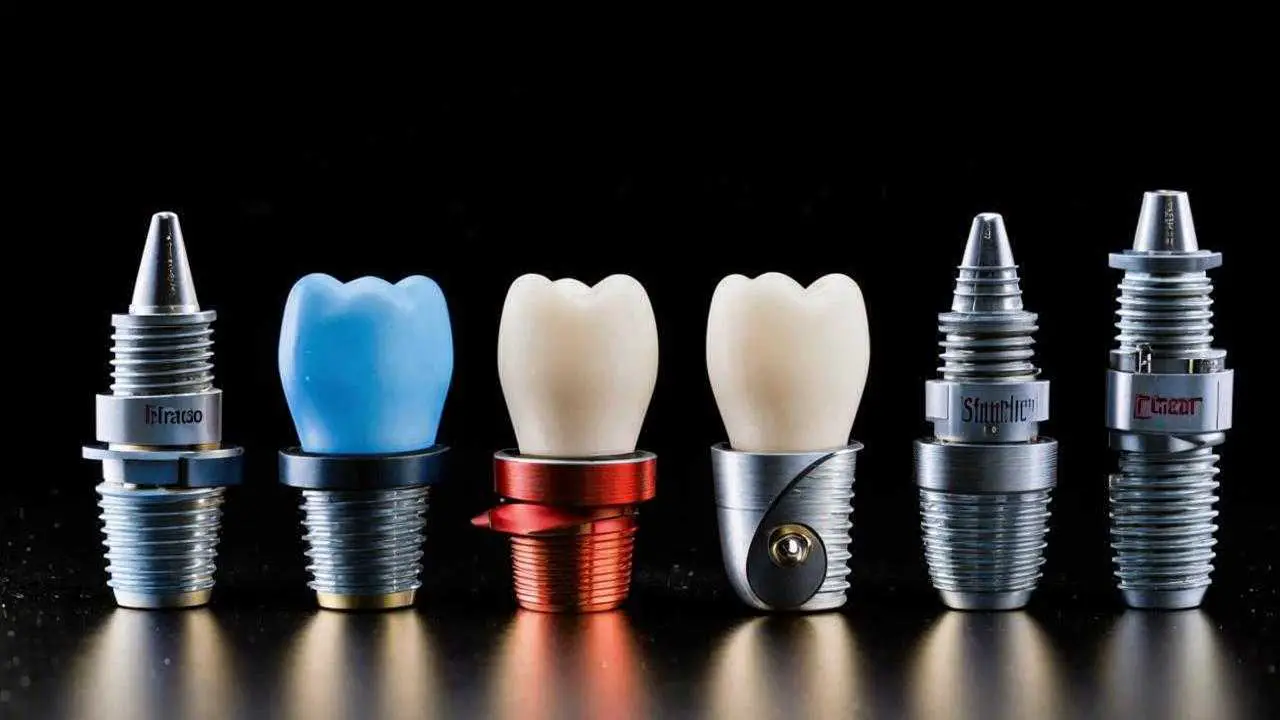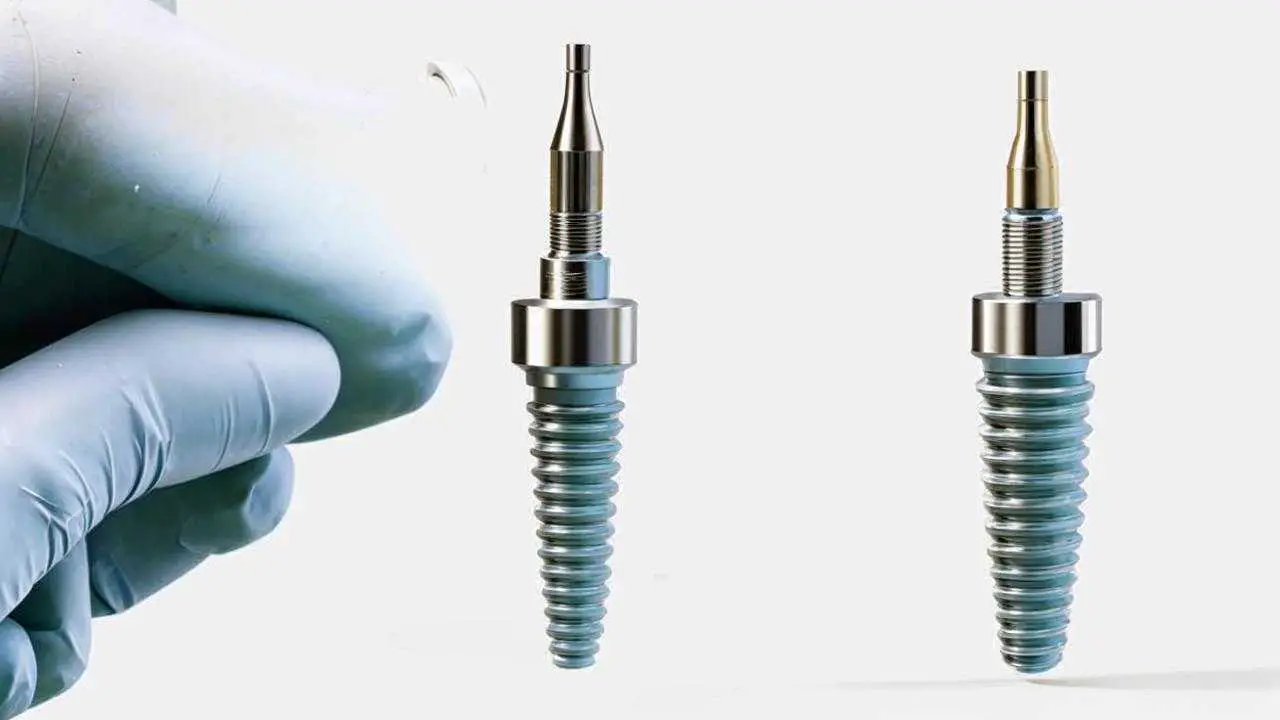Implantation is the replacement of a natural tooth with an artificial root, an implant. It is the only way to restore a tooth row that fulfills all the functions of natural teeth. Such treatment is expensive, so many patients are concerned with the question: what is the service life of dental implants?
There is no unambiguous answer, because the duration of use is influenced by a lot of factors. First of all, it should be understood that an implant is a product that consists of several parts. A titanium post is screwed into the gum, where it overgrows bone tissue and acts as a tooth root. The abutment is a transitional piece. It connects the post and the crown, the visible part of the tooth.
It should be borne in mind that the placement of a crown is not implantation, but prosthetics. The duration of use of crowns depends on the material, but in general, it is much shorter than that of an implant. For plastic – 2-3 years, metal-ceramic – 6-7 years, ceramic (E-max, Empress, etc.) and zirconium – up to 20 years.
How long a dental implant lasts
It is impossible to predict in advance how long an implant will last, but it is possible to consider the factors that lengthen the period of its use. These can be divided into 3 large groups: manufacturers, clinic and doctors, and patients.
Manufacturers
The larger the company, the more money it invests in scientific and technological development. Therefore, products of world brands Nobel Biocare, Straumann, Dentsply Sirona, Trate AG have a lifetime warranty. Well-known Korean and Israeli brands: Dentium, Osstem, MISS, Noris, Alfa Bio, also provide a lifetime warranty.
Russian and Chinese implants can not yet catch up with the world leaders in the production of dental products, they do not have a lifetime warranty.
All manufacturers use medical titanium for manufacturing pins. But some products take root better, others worse. This is influenced by the coating of the rod. Major brands fund research to accelerate osseointegration (engraftment). Their coatings are patented and accelerate the process of engraftment by 1.5-2 times. The faster the post takes root, the less risk of losing it.
The shape of the post, the angle of the abutment, the way the screw is threaded, the way the crown is attached – everything affects how many years the dental implant will hold the tooth. The broader the product line, the more possibilities the implantologist has to choose a design for a specific case. For example, the ROOTT Swiss implant range has 84 varieties. From such an assortment, it is easy to choose the right one. This means that the percentage of engraftment will be high.
Clinic and dentists
The dentistry is responsible for ensuring that the products offered to patients are original, certified and research-proven. Small dentists often want to save money and buy cheaper products without paying attention to quality. Large clinics carefully select suppliers and check all documentation.
The success of implantation is 80% dependent on the skill of the doctor. High-quality specialists usually work in large dental centers. They regularly upgrade their qualifications and often teach themselves. This is why large clinics offer a guarantee for the work of the doctors. This means that if an implant fails to take root due to a doctor’s error, a second implantation will be free of charge.
But even the best implantologist can miss important details if the image or CT scan is taken with a weak, old machine. It is therefore important to choose a clinic with modern equipment where the resolution is high and the radiation exposure is low.
Patients
After implants are placed, each patient receives a list of recommendations. On the extent to which they are followed, also depends on the life of dental implants. Yes, the implant fulfills the role of a natural tooth, but chewing nuts and contact sports are also dangerous for natural teeth. It is especially important to take care of the implant during the period of engraftment. Overloading can cause the post to shift, which leads to rejection or peri-implantitis (inflammation of the tissue around the stem).
Not only is it important to maintain hygiene at home, you must clean the structures from plaque on a regular basis. This also lengthens the time that dental implants last.
Even if everything seems fine to the patient, a preventive checkup with the dentist 2 times a year is necessary to prevent complications. Decay of neighboring teeth, their loss, inflammatory diseases of the mucosa affect how long the implants last. Regular visits to the doctor reduce the risks of such diseases, prolonging the life of the posts.
Another consideration is how quickly you see a doctor. If implantation is performed immediately after tooth loss, the bone tissue will remain dense. In such tissue, the tooth implant holds firmly. But in case of its atrophy it is necessary to resort to additional manipulations (bone grafting) or to install zygomatic implants.
How to prolong the life of an implant – conclusions
How much does a tooth implant cost today may seem like a huge sum, but in the long term, implantation turns out to be more profitable than a regular change of dentures. After all, if certain conditions are met, it can be used for a lifetime. The average lifespan of implants is 20 years, even for budget brands. During this time, a removable denture will have to be replaced at least 4 times.
In order to forget about replacing the implant you need to follow simple rules:
- Choose a brand not by cost, but by reputation. Today there is an opportunity to put premium implants at a budget price. For example, Swiss ROOTT implants. The percentage of engraftment is not lower than that of premium brands (about 99%), and the cost is somewhat lower.
- Entrust implantation to a doctor with high qualifications. The skill of the doctor largely determines how long a tooth implant lasts.
- Go to a clinic with modern equipment and its own dental laboratory. The technicians in their own laboratory work with the implantologist as a team. They are interested in maintaining the reputation of the clinic and try to do their work on “five”.
- Follow the doctor’s recommendations.
Exclude certain foods (breadcrumbs, nuts, toffees) for the time of implantation, perform regular hygiene procedures, visit the doctor and do not refuse professional teeth cleaning.
Implants are a long-term investment. It not only makes your smile pleasant, but also improves your quality of life and gives you self-confidence.

